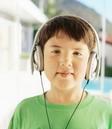|
| |
Sound Sensitivity:
A Summary of Probable Causes of Hypersensitivity to Sound
(Hyper acute
Hearing)
Contact Us
Complete
On-line AIT Checklist
Read
also: Sound Hypersensitivity and Berard AIT
A Summary of Probable Causes of
Hypersensitivity to Sound
(Hyper acute
Hearing)
The causes of
auditory sensitivity can be classified into two categories: biochemical
(which includes nutritional deficiency and drug side-effects) and physiological.
MAGNESIUM DEFICIENCY:
-
It is well established that
nutritional effects may result in hypersensitive hearing.
-
Many individuals who are deficient
in magnesium suffer from sound sensitivity, and they often experience
an improvement after receiving magnesium supplements. According
to the Autism Research Review International (1990, Vol. 4, No. 4),
20 milligrams per each 10 pounds of body weight per day, is
an appropriate amount of magnesium. Improvement would occur within
a few days if the cause of the sensitivity is a magnesium deficiency.
ASPARTAME USE (Nutrasweet)
- Some medications have ototoxic side-effects that
may result in auditory hypersensitivity and/or other auditory system
problems such as tinnitus and vestibular dysfunction.
- Dr.
Guy Berard cautions against the use of antibiotics
in the aminoglycocide family, including erythromycin, gentamicin,
garamycin, neomycin, tobramycin, etc.
- Other medications with known ototoxic side
effects include: Advil, aspirin (salicyclates), Benadryl,
Beta blockers, Desipramine HCI (Norpramin), Empirin, Imipramine
(Tofranil), Motrin (ibuprofen), Naltrexone (Trexan), Sel-dane,
Tavist, and Tegretol. Author Elaine Suss reports
in her book, When
the Hearing Becomes Hard, that diuretics are also known for
ototoxicity and must be used with caution.
STRESS AND ANXIETY
- Other biochemical causes include changes in the
system due to stress and anxiety.
- Many people have reported increased auditory hypersensitivity
during periods of stress and anxiety, i.e., exam week at college.
- Other sensory perceptions, such as tactile, taste
or smell, may also be heightened. This may be related to stress-induced
biochemical changes. Once the stress-related experience is over, the
hypersensitivity usually decreases. Nutritional stress formulas may
also be helpful.
AN OVERLOADED SENSORY SYSTEM
-
The sensory system may also be
over aroused by changes in the person's biochemistry, including increases
in toxins produced by an overgrowth of yeast and fungus, and possibly
exposures to other toxins (e.g., heavy metals, toxic chemicals).
- Auditory hypersensitivity (hyperacute
hearing)
may escalate during this exposure and may be restored to more normal
levels when the toxins are removed. Other techniques, such as
brushing therapy, joint compression and deep pressure, can sometimes
be used to help calm the nervous system while seeking appropriate
treatment for the toxins.
OTHER PHYSIOLOGICAL CAUSES
- Physiological causes may include:
- damage to the auditory system through exposure
to loud noise,
- traumas such as whiplash,
- abnormalities in function of the brainstem or
higher cortical areas.
- A study by Deborah Woodward of Woodward Audiology
in McLeansville, NC revealed that in children with autism,
the binaural tolerance to speech noise, prior to Auditory
Integration Training, was 9 to 11 dBHTL less than the monaural
tolerance level (see The Sound Connection, 1994, Vol. 2, No. 2).
This may indicate abnormal amplification in the brainstem or lack
of bilateral inhibition.
- A study by Collett et al., published
in The Lancet (1993, Vol. 342, pages 923-924), produced
results that may indicate an alteration in the functioning of
the medial olivocochlear (MOC) bundle which is located in the
brainstem, and may explain sound sensitivity in autistic
people.
- There is also speculation about a possible link
between hypersensitive hearing and the amygdala, located
in the limbic system of the brain. Dr. Margaret Bauman's
research found that some neurons in the amygdala
are abnormal. There are auditory pathways to the amygdala responsible
for fear conditioning to sounds. It is possible that the abnormal
functioning in the amygdala plays a role in the development
of a dysfunctional fear response to sounds. Perhaps Auditory
Integration Training stimulates the amygdala
in some way that reduces this fear.
It is clear that there are many possible causes of hypersensitive
hearing. One must learn about these causes and try to determine what might
be the cause for a particular individual. If that can be determined, an
appropriate intervention can be selected. When certain things that are
possible to control have been ruled out, Auditory
Integration Training may be an appropriate intervention to use for
decreasing sound sensitivity.
This article appeared
in The Sound Connection, a
quarterly
newsletter of the Society for Auditory Intervention Techniques Original
document.
| |
|






